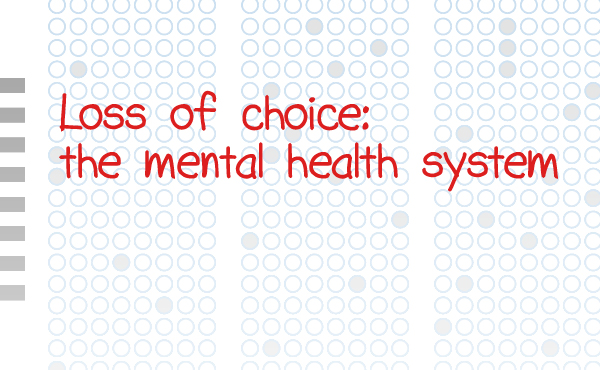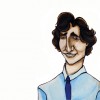Loss of choice
the mental health system

I am a returning University of Victoria student, currently studying Psychology. I am in my late 40s, reasonably intelligent and well read. I have many interests: I love to learn, I love music, I love children, I am crazy about animals, I love to make people laugh, I love the great outdoors, I love to travel, and I love to cook and eat well. I exercise regularly, I work part-time, I volunteer, and I have an active social life. By all standards, I live a decent life.
I am also certifiably insane. That’s not hyperbole: my independent lifestyle has been contingent upon my adhering to psychiatric treatment. This arrangement carries the force of law, so if I don’t show up for a doctor’s appointment or refuse my care team access to my home, I can be arrested under British Columbia’s Mental Health Act. Consequently, I am, as they say, “known to the police.”
The beginning
How did this strange set of circumstances come to be? It started in the late ’80s at the University of British Columbia. I was 21 or so, and as I was finishing my pre-veterinary studies, I became overwhelmed with feelings of anxiety. Eventually, the feelings became so intolerable that I had to drop out of school and move back in with my parents. I then went to visit my family doctor, who referred me to a psychiatrist. First mistake. The psychiatrist encouraged me to say exactly what I was thinking, so I did. Second mistake. I was admitted to the Eric Martin Pavilion at Victoria’s Royal Jubilee Hospital with a diagnosis of suicidal ideation. I was only there for about a month, but the experience traumatized me. When I got out, I suffered from nightmares and even more extreme anxiety that I would be arrested and locked up again. I was sequestered in my parent’s basement, convinced I was an absolute failure. From time to time, when the anxiety overwhelmed me, I would make a feeble suicide attempt and end up back at the hospital for a week or so.
After a more serious suicide attempt, I was hospitalized for a long time. My medical records show that at this point I was given Stelazine (an antipsychotic) in addition to my various antidepressants and tranquilizers. Excerpts from my records during this time include “asking repeatedly to go home . . . frightened of hospital . . . says food is disgusting . . . meds increased . . . judged an elopement risk . . . not convinced prescriptions will help . . . ” At this point, my refusal to agree that I had a bona fide illness was termed “lack of insight,” which brought the further and much more serious diagnosis of schizophrenia that required—often via force—Surmontil, Kemadrin, Haldol, and Chlorpromazine, among other drugs. This massive and extended psychiatric assault upon my brain didn’t agree with me, and I fell into a three-year cycle of madness.
Eventually, the schizophrenia diagnosis was abandoned and a diagnosis of bipolar disorder took its place. This was a marginal improvement, I suppose, as schizophrenia is considered to be the epitome of mental illness, and those afflicted are generally feared and reviled. My medical records indicate that I was now: “grandiose . . . loud . . . demanding . . . sarcastic . . . euphoric . . . flippant . . . provocative . . . not cooperating with voluntary transfer to Psychiatric Intensive Care, carried by security staff . . . smiling inappropriately . . .” So the doctors added Lithium, Cogentin, Serax, Tegretol, Ativan and, eventually, electroshock “therapy” to my treatment regimen. Subsequent medical records include “uncooperative…security called . . . writing incoherent essays . . . looks physically unwell . . . [electroshock] next week . . . fearful and tremulous . . . self-inflicted knife wound, sutured . . . gait shuffling and stiff . . .”
At some point, I realized that the only way out of this nightmare was to agree with my captors that I was neurologically defective, that I needed medication for life, and that the best I could hope for was to find an inexpensive apartment somewhere and collect welfare. My co-operation was duly noted and I was released.
But, in fact, I secretly disputed their dismal predictions and got quite a good job as a legal assistant. Over time, I worked for various firms in town and, if reference letters are any indication, I was a talented and valued employee. Things were good: I had relatively well-paying work, owned my own home, travelled, and had horses. This bliss lasted for over a decade, all without psychiatric interference.
Relapse
Unfortunately, madness reared its ugly head again in my mid-30s. I became obsessed with some kind of a perceived link between my wedding and the September 11 attacks that happened three days later. I should have been looking forward to an extended European honeymoon, but I could already feel that dark cloud coming down. When we returned home, crippling anxiety struck once again. I did everything I could, trying to will it away. I told no one. Eventually it became unbearable, and once again, it seemed to me that the only solution was death.
I suppose I must have the constitution of an ox, because I survived my suicide attempt through kidney dialysis and other treatments. It was close, though. My husband and parents were told to “expect the worst,” as my liver transplant was arranged. When the doctors asked why I had done it, I replied, “Because I couldn’t think of anything left to do.”
This was the beginning of my second tangle with British Columbia’s psychiatric system. This one lasted far longer (about 10 years), but it was otherwise very much the same: many MHA (Mental Health Act) arrests, hospitalizations, suicide attempts, psychiatric labels, medications, criminal convictions, the loss of many friendships, poverty, homelessness, street drug use, isolation, and overwhelming despair. I protested that my intervening healthy decade would indicate that my troubles were not neurological, but rather I was dealing with situational (and thus relatively treatable) anxiety that was being exacerbated by psychiatric treatment to the point of disaster—but my words fell on deaf ears.
On mental health
I have experienced things many in our society wouldn’t inflict on convicted murderers. And yet, the mental health system places mental patients in a special category of their own, one where our most basic charter rights (including the right to security of the person and the right to not be arbitrarily detained) are routinely denied. Ten years ago, the Supreme Court of Canada (in Starson v. Swayze) declared that a patient’s competence is a separate issue from their ultimate treatment decision. In other words, merely rejecting treatment does not in itself indicate incompetence. Today, this ruling is still being ignored. As it stands now, one can be considered competent to consent while incompetent to refuse. Either way, you are going to take the prescribed drugs, whether you consent or whether the director of a facility provides your “deemed consent.” This creates an insidious grey category, in which patients are “consenting,” but only under threat of involuntary treatment.
I remember, as a voluntary patient, telling a doctor that I didn’t like him and I wouldn’t be coming to my next appointment. He told me I could come back or else he would “send the police out to bring [me] to the hospital in handcuffs.” Despite the outcome in the Starson case, there is simply no mechanism available for a patient to say, “Yes, I understand the consequences of my decision. Nevertheless, I choose to decline.”
If, as my doctors claimed, all mental illnesses (mine included) are neurological disorders, they’re certainly very unusual ones. Try to name one other neurological condition that can (and often does) go into complete remission without treatment. Indeed, although psychiatry is a right fit for some, many of the people I have known who have made the most spectacular recoveries are those who have rejected psychiatry altogether. But the mental health sector continues to reject the idea of more humane and effective treatments, and removes any agency from those they deem to be disturbed. For me, and for many others, “for your own good” proved to be the scariest phrase in the English language.
And even if we frame mental illness as genuine disease, where does that leave us? Heart conditions and various metabolic problems related to obesity are certainly diseases, yet we’re not rounding up obese people and forcing bariatric surgery upon them. We allow people to smoke. We allow people to gamble. We allow people to drink alcohol in excess. We allow people to do all kinds of irresponsible and dangerous things. Except, we do not allow people to think strange thoughts; that’s prohibited.
Reaching out
You wouldn’t guess any of this by looking at me, because I put a lot of effort into passing for sane. Despite my facade, I acknowledge that I am not normal, in the sense that I often think and act in ways that other people don’t. It is not normal to think that the tree outside my window is an exact and planned replica of the Falling Man photo from 9-11. Nor is it normal to think that people would like me better if I killed myself. Nor is it normal to get out of bed six times a night to check just one more time that my front door is locked. Yet, I see these and many other quirks as dysfunctional thoughts and behaviours, distinct from pathology. And apart from my present exam anxiety, now at alarming levels, and my incessant need for reassurance, I am quite happy. Although, I lost my job, home, husband, horses, and self-esteem years ago.
Going back to school after all this time is a glorious adventure, and I find it energizing to be surrounded by such enthusiasm; however, sometimes I find it difficult to relate to the other students. Not only are they younger than me, but my life has been very different from theirs. As well, in my psychology program, my professors often approach mental health issues in a way that my personal experiences contradict. I struggle to balance my quest for good grades against my obligation to give informed answers, not what is being sought by my professors. My rule is that on multiple-choice exams that will be marked by computer, I shall be content to say whatever the text tells me (e.g. that schizophrenia is a valid construct or that electroshock is only done with informed consent). But if it’s in my own handwriting, and will be read by an actual human being, it gets trickier. I have already lost marks for my non-conformist but nevertheless reasonable views.
And then there are the smaller things. I don’t, for instance, know how many more times I can hear the word “like” in the middle of a sentence, but these are minor obstacles, more to do with advanced age than mental status.
What I find myself currently missing is friendship with other people like me within the UVic community. The Mad Students Society is a peer support and advocacy group that I am actively involved in for students who have lived experience within our mental health system. The society is based in the Toronto area but welcomes members from all over. In the group, we discuss any and all pertinent issues, including our constant fight against “sanism” (mentalism), defined as the mainstream’s marginalization and rejection of those of us with psychiatric labels. To anyone out there dealing with these issues, I would like to extend an invitation to check out our website, madstudentsociety.com. And, if anyone is interested in starting a UVic chapter of the Mad Students Society, please feel free to email me at madstudentssociety@yahoo.ca.





